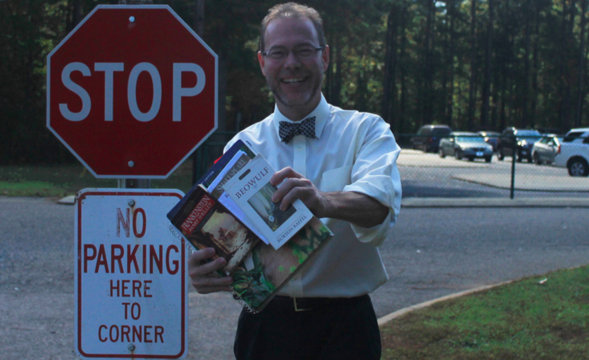You are spending one last day at the beach, the wind in your hair, your eyes closed… and suddenly it hits you. You haven’t started reading the three books and chemistry packet yet for summer homework. Uh-oh. You frantically text all of your friends and spend all night on SparkNotes and Shmoop.
If this sounds like you, you’re not alone. Many students find summer homework overwhelming and useless, so what is the point of it all? Does it really benefit you?
Experts call the amount of academic skills lost during summer break the “summer slide,” which can put students behind at the beginning of the school year. Harris Cooper, professor of Psychology and Neuroscience at Duke University, studies the effects of summer homework on learning. In an interview with the New York Times, he explained his view.
“Many educators argue that children learn best when instruction is continuous,” Cooper said. “The long summer vacation disrupts the rhythm of instruction, leads to forgetting and requires time be spent reviewing old material when students return to school in fall.”
Aaron Freeman, a science teacher, has summer homework for her AP Chemistry and AP Environmental science classes for the reasons Cooper addressed.
“I assign a summer assignment, and if [students] adhere to my timeline and practice what I preach, then [they] will have thought about chemistry all summer long,” Freeman said. “So it saves me time… in the beginning to catch everyone up from the summer slump.”
English summer reading is no new thing at Northwood. English teacher Christine Mayfield believes in summer homework’s effectiveness.
“Especially with the semester system it can sometimes be a whole year between English classes for many students, and summer would be a chance to do at least some reading and writing in between,” Mayfield said.
Kathleen Greenlee, an English III teacher, agrees with this sentiment, but thinks there are some negative aspects as well.
“The main drawback, especially for the standard classes, is getting the kids to read,” Greenlee said. “Many kids, even at the honors level, brag about never having read. [They have] done SparkNotes and CliffNotes and Shmoop and whatever in place of reading. And that’s frustrating because the novels we assign are extremely engaging and well written novels, and they’re important to American Literature.”
Plagiarism is a problem concerning summer homework and makes people question the effectiveness of summer homework in the learning process. Freeman’s tactic for dealing with plagiarism in her AP Chemistry and AP Environmental Science classes is simple.
“I divide the [summer assignment] grade in half; [plagiarism] is very obvious to most teachers,” Freeman said.
Many kids confess to using online sources, and admit using friends to help with summer homework. Some do it as a result of procrastination and others just don’t want to read the book. But many students also vouch for the helpfulness of these sites and usefulness of friends. They use them as assistance rather than to cheat.
“[Using online sources] is really helpful and the information that it provides really keys on what the teacher may be looking for,” said a senior taking AP Literature.
While many say the summer homework would have been more helpful without the assistance from the internet, some think that it would have been more confusing.
“I didn’t use [online sources] for cheating purposes, but after I was done reading, I was very confused about one of the chapters, so I used it as a reference,” said a junior taking English III honors. “After reading that chapter I was like, ‘What is going on here?’ … It definitely made my life easier, just the understanding portion of it.”
Just like the conflict between whether online sources benefit students, opinions differ on whether summer homework is helpful. The new change in adding AP United States History (APUSH) summer homework. APUSH teacher Sara Keever hoped that it would make the class less overwhelming.
Bailey Poplin, a senior in APUSH, felt that the homework not only made the class bearable but was enriching as well.
“I really found it helpful,” Poplin said. “It really went into detail and it opened us up to a lot of American history, more than you would even think. So when we got to the course, we had some background knowledge of it.”
Wallace Mann, a junior, was part of many disgruntled APUSH students, frustrated with the amount of work for summer homework. He thought that there was no use for the work after the first few days.
“All the information we learned in the summer reading assignment was used merely to give you a grade at the beginning of the year, more-so than to teach you about the subject,” Mann said.
Keever believes it was due to the fact that it was her first summer homework attempt, but also thinks it was partly because of the effort of the students.
“My intentions of having them start on the right foot and having all these diverse perspectives were totally lost in their attempt to just do as little as possible and not really take it seriously,” Keever said.
Ultimately, Freeman believes the helpfulness of summer homework is all based on whether the student follows the directions correctly.
“If they were to drink my Kool-aid,” Freeman said. “They would reap the benefits of it.”
– By Meredith Avison & Jala Gunn


